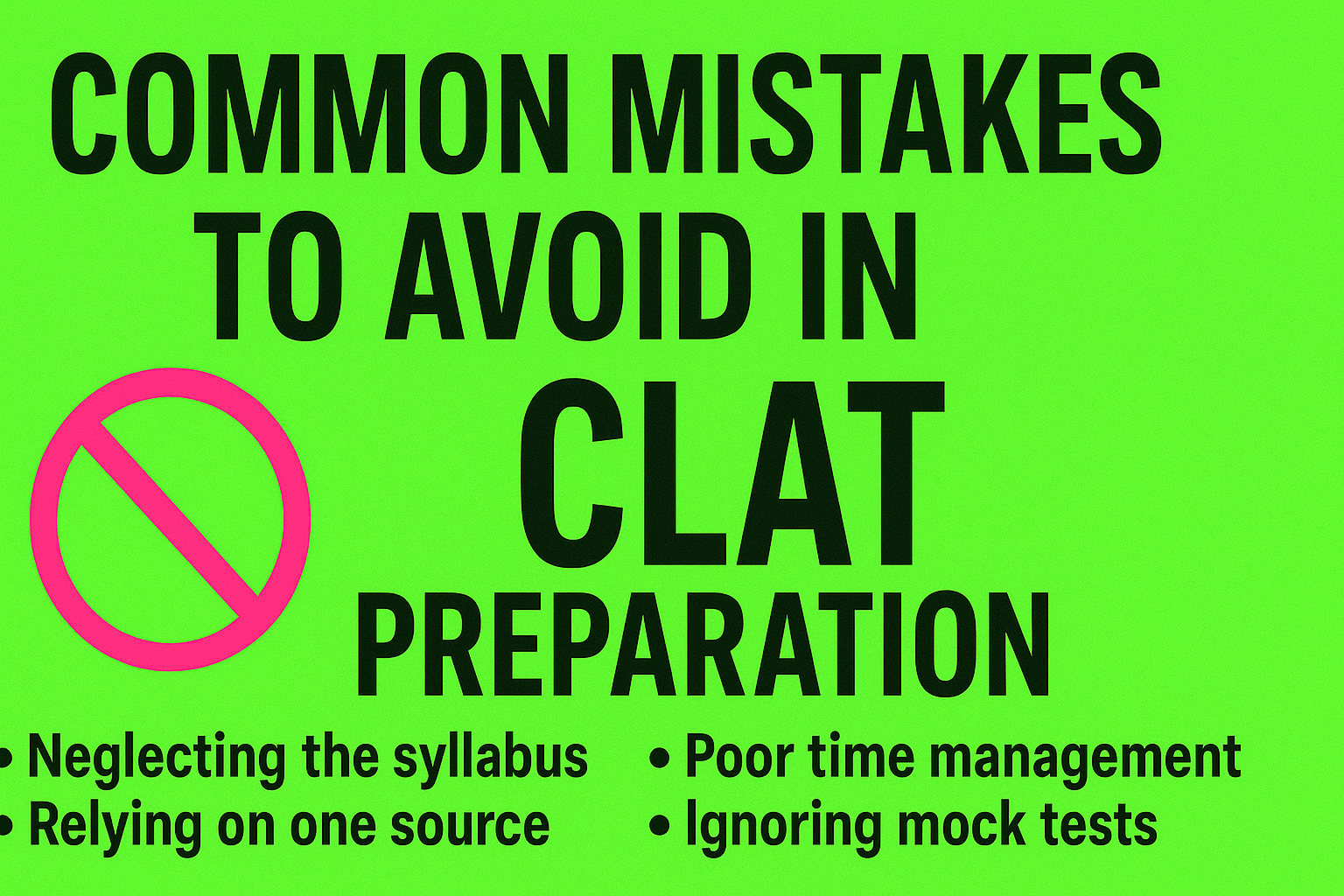Preparing for the Common Law Admission Test (CLAT) can be a challenging journey, especially with the intense competition and evolving exam pattern. While students focus on acquiring knowledge and practicing questions, many often fall into avoidable traps that hamper their preparation. To ensure you stay on the right path, here’s a detailed guide on the common mistakes to avoid in CLAT preparation and how to overcome them.
1. IGNORING THE CLAT SYLLABUS AND EXAM PATTERN
One of the biggest mistakes aspirants make is jumping into preparation without fully understanding the CLAT syllabus and exam pattern. Each section—English Language, Current Affairs including General Knowledge, Legal Reasoning, Logical Reasoning, and Quantitative Techniques—requires a specific strategy.
Avoid This:
Go through the latest CLAT syllabus released by the Consortium.
Understand the number of questions and weightage per section.
Allocate time and effort proportionally to each section.
2. FOCUSING ONLY ON ONE OR TWO SECTIONS
Many aspirants tend to focus only on their strengths—be it Legal Reasoning or English—and ignore the others. This results in an unbalanced performance in the final exam.
Avoid This:
Prepare every section with equal dedication.
Identify weak areas early and work consistently on them.
3. NOT PRACTICING ENOUGH MOCK TESTS
CLAT is a time-bound, comprehension-based test that demands both speed and accuracy. Students who avoid mock tests miss out on understanding the real exam pressure.
Avoid This:
Start giving mock tests at least 2–3 months before the exam.
Analyze every mock test thoroughly to identify patterns and weak areas.
Simulate real exam conditions to improve time management.
4. IGNORING NEGATIVE MARKING
CLAT has negative marking (0.25 marks deducted for each wrong answer). Over-attempting or blind guessing can reduce your overall score significantly.
Avoid This:
Answer only those questions you are confident about.
Develop smart guessing techniques based on elimination.
5. NEGLECTING CURRENT AFFAIRS
Current Affairs is a high-weightage section in CLAT. Relying only on monthly magazines or last-minute cramming is insufficient.
Avoid This:
Read newspapers like The Hindu or The Indian Express daily.
Follow a monthly current affairs magazine or video series for revision.
Focus on legal current affairs and international developments as well.
6. LACK OF A TIME-BOUND STUDY PLAN
Many students start preparing without a clear study plan. This leads to procrastination and incomplete coverage of the syllabus.
Avoid This:
Create a daily and weekly study schedule.
Set realistic goals for each day.
Include revision and mock tests in the plan.
7. OVER-RELIANCE ON COACHING INSTITUTES
While coaching can provide structure and guidance, some students depend solely on it and avoid self-study or practice.
Avoid This:
Use coaching as a support system, not a crutch.
Self-study and practice are irreplaceable.
Use online resources, books, and test series to diversify your preparation.
8. POOR TIME MANAGEMENT DURING THE EXAM
Even well-prepared candidates may struggle in the actual exam due to poor time allocation.
Avoid This:
Practice section-wise time management during mocks.
Attempt your strongest section first to gain confidence.
Avoid spending too much time on one question.
9. NOT REVISING REGULARLY
With so much information, it’s easy to forget key concepts, current affairs, and formulas if not revised periodically.
Avoid This:
Make short notes for each section for last-minute revision.
Set aside weekly slots just for revision.
Revise mock tests, legal principles, and vocabulary regularly.
10. IGNORING MENTAL AND PHYSICAL HEALTH
Preparing for CLAT can be stressful, and ignoring health can impact your focus and productivity.
Avoid This:
Take short breaks, sleep well, and eat healthy.
Include relaxation techniques like meditation or light exercise in your routine.
Avoid burnout by balancing study with leisure.
CONCLUSION
CLAT preparation is not just about studying hard—it’s about studying smart. Avoiding these common mistakes can make a significant difference in your performance. With the right strategy, consistent practice, and a clear mind, success in CLAT is well within your reach.
FREQUENTLY ASKED QUESTIONS (FAQs)
Q1. Is it okay to start CLAT preparation without coaching?
Yes, many toppers have cleared CLAT with self-study. Coaching can help but is not mandatory. Discipline, mock tests, and smart resources are key.
Q2. How many mock tests should I take before CLAT?
You should aim to take at least 20–30 full-length mock tests, along with section-wise practice.
Q3. Can I leave the Quantitative Techniques section if I’m weak in maths?
No, all sections carry weight. Instead of skipping, focus on mastering basic concepts and practice regularly.
Q4. How should I handle negative marking in CLAT?
Avoid blind guessing. Eliminate wrong options and attempt only those questions where you’re reasonably confident.
Q5. What is the ideal time to start CLAT preparation?
Starting 1 to 1.5 years in advance is ideal, but even 6–8 months of focused preparation can yield good results with the right strategy.






